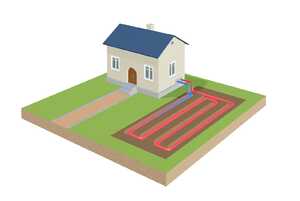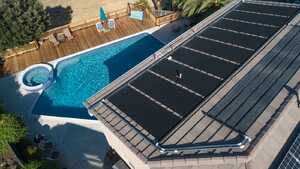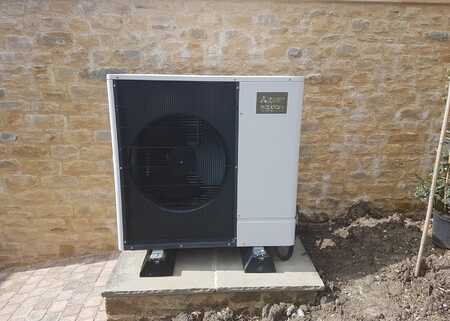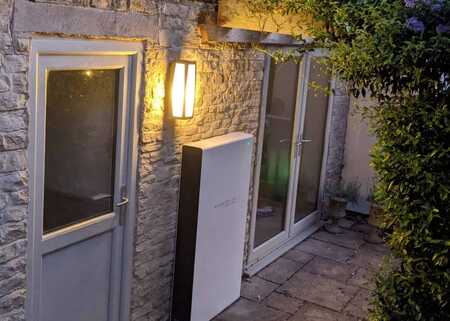Can I heat a swimming pool with renewable energy?
Yes, it is possible to heat a swimming pool using renewable energy. In fact, many people are turning to renewable energy sources to heat their pools in an effort to reduce their carbon footprint and save money on energy costs. It can also reduce the amount of maintenance required, too, depending on which renewable energy source you choose, because there are a number of options for you to consider.

Heating a swimming pool using an air source heat pump
Specifically recommended for outdoor pools during the summer months when they’re getting the most use, air source heat pumps (ASHPs) are more efficient when the water temperature is warmer naturally.
For people who already heat their homes in winter with an ASHP, you can make use of it in the summer to heat your pool instead. It doesn’t have to be used on its own, you can also pair it with solar thermal energy to maximise the enjoyment you can get from your pool.

Ground source heat pumps
Another option for heating a pool using renewable energy is with a ground source heat pump. Sometimes referred to as geothermal heat pumps, these systems use the constant temperature of the ground to heat and cool buildings, and can also be used to heat a swimming pool. Ground source heat pumps are highly efficient and can provide a consistent and comfortable temperature for swimming.
These are usually recommended for indoor pools that require heating, and the size of the pump you’ll need depends on how much heat is retained within the pool structure. This means the better insulated the pool is, the smaller the pump you’ll need.
How do they work?
Ground source heat pumps use a network of underground pipes, called a ground loop, to extract heat from the ground. This heat is then transferred to a heat exchanger, where it is used to heat the water in the swimming pool. The ground loop system is designed to be highly efficient, so it can extract a large amount of heat from the ground, even in cold weather.

Solar thermal energy
We’ve already mentioned that solar thermal can be paired with heat pumps, but it can also be used entirely on its own. This is the cheapest option of the three, with the water being filtered then passed through a collector that collects heat from the sun in order to heat the water. It’s incredibly clever stuff! It’s very dependent on there being daylight though, so your location within the UK might determine whether or not it's a good idea to rely on solar alone.
If you would like some advice on renewable energy and the best way to heat your swimming pool, home, or business, please get in touch with us.
You might also be interested in...

Boiler Upgrade Scheme - What you Need to Know 12/05/2022
Investing in low-carbon heating solutions is the most effective method of securing an ecologically sustainable future, and this new government scheme will encourage property owners to replace their existing fossil fuel heating with more efficient, low-carbon systems.

Ground Source Heat Pump and Solar PV Project in Somerset23/11/2020
This client wanted to reduce the running costs of his family home, and reduce their carbon footprint by eliminating their reliance on heating oil.

Can I heat a swimming pool with renewable energy?06/12/2022
Many people are turning to renewable energy sources, such as solar power, to heat their pools in an effort to reduce their carbon footprint and save money on energy costs, and there are a number of different ways to heat a swimming pool using renewable energy.
Posted on December 6th 2022


